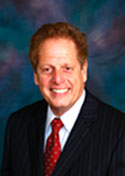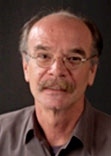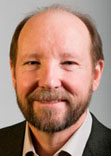2011
 Cathy Cavanaugh, Ph.D. | October 2011
Cathy Cavanaugh, Ph.D. | October 2011
Cathy Cavanaugh, associate professor of educational technology at the University of Florida's School of Teaching and Learning, participated in the National Center for Research on Rural Education's Creating Rural Connections Speaker Series in October 2011. Dr. Cavanaugh presented on "Evidence-Based Practices for Online Teacher Professional Development."
The presentation highlighted promising, online-based efforts to enhance the knowledge and practice of K-12 educators. Cavanaugh also provided specific guidelines, recommendations and examples for developers and facilitators of online professional development programs.
Cavanaugh's primary research interests include indicators of quality in online and blended education and equitable access to quality education through technology. She has conducted studies of classroom technology and professional development in Florida schools, effective practices in virtual schools, online professional development, and design of online and blended courses.
Cavanaugh has served as co-director of the Northeast Florida Science, Technology and Mathematics Center, as assistant director of the Florida Center for Instructional Technology, and as a classroom teacher in Florida and the Caribbean. She holds a bachelor's in education from the University of the Virgin Islands, a master's in education from the University of Central Florida, and a doctorate in curriculum and instruction from the University of South Florida.
 Jim Knight, Ph.D. | April 2011
Jim Knight, Ph.D. | April 2011
The National Center for Research on Rural Education commenced its 2011 Creating Rural Connections Speaker Series with an April visit from Dr. Jim Knight, Research Associate with the University of Kansas Center for Research on Learning.
The presentation, "Leveraging Coaching for School Improvement: Theory and Practice of Instructional Coaching," focused on the form of teacher professional development that Knight has dedicated more than a decade to studying. Approximately 60 teachers, coaches and researchers attended.
Knight opened the presentation by discussing the difficulties and potential pitfalls of professional development efforts. Having interviewed many teachers over the years, he shared quotes from those who expressed frustration with the limitations and impracticality of traditional professional development workshops.
"What we see, again and again, is that a workshop, by itself, doesn't do much in terms of changing teaching practices," Knight said.
Knight then explained the process of developing a response to these frustrations – a response that would eventually become Instructional Coaching. That process began with the advent of the Partnership Learning Approach, a forerunner of Instructional Coaching that emphasized principles such as equality, choice, dialogue and reciprocity.
"It's my belief that we will never get the kind of schools we want unless the professional learning we [implement] creates this opportunity for a mutually humanizing conversation," said Knight, "[in which] all parties feel like they've been heard."
Though Partnership Learning improved teachers' comprehension of and engagement with professional development, Knight said participants often failed to implement the strategies they gleaned from it. This realization led him to develop Instructional Coaching, which emphasizes modeling, observation and teacher-directed goals to encourage buy-in from participants.
"For us, Instructional Coaching is a way of helping people learn proven practices," Knight said. "We're all about learning a practice to change beliefs [about teaching]."
After reviewing the essential components and demonstrated impacts of Instructional Coaching, Knight summarized efforts to continually refine and modify the approach according to feedback from coaches, teachers and students. He concluded by outlining plans for future publications and studies that will further evaluate and augment Instructional Coaching. A 20-minute question-and-answer session followed the presentation.
 Louis Cicchinelli, Ph.D. | January 2011
Louis Cicchinelli, Ph.D. | January 2011
R²Ed kicked off the Advances and Opportunities in Rural Education Research Speaker Series with a January visit from Louis Cicchinelli, executive vice president of Mid-continent Research for Education and Learning (McREL) and a member of R²Ed's National Leadership Advisory Board.
Dr. Cicchinelli opened his presentation, "Rural Schooling: Necessity is the Mother of Innovation," by discussing scholarly and everyday conceptions of rurality. After providing a background on McREL, he examined the need for quality rural education research and enumerated common topics addressed by rural scholars. He also delved into a recent co-authored meta-analysis, noting that much research classified as "rural" failed to truly address questions, issues, arguments or phenomena specific to rural communities.
In addition to reviewing practical limitations that have hindered rural research, Cicchinelli offered examples of creative approaches to overcoming such obstacles. He followed with an overview of reform priorities for rural schools and concluded with a potential rural research agenda focused on promoting quality teachers through policy studies, improving graduation rates with best practices, and ensuring equity for all rural students.
2010
 David Cordray, Ph.D. | April, 2010
David Cordray, Ph.D. | April, 2010
David Cordray, Ph.D., Professor of Public Policy and Psychology at Vanderbilt University, visited the National Center for Research on Rural Education in April 2010 as part of the Research Methodology Series on Randomized Trials in Social and Behavioral Sciences. His presentation, Assessing Implementation Fidelity and Achieved Relative Strength in RCTs: Concepts and Methods, centered on assessing two important aspects of randomized controlled trials: implementation fidelity and achieved relative strength. Cordray laid out several definitions of implementation fidelity, common sources and types of infidelity, and the practical and statistical repercussions of failing to fulfill implementation standards. He explained the calculations for implementation fidelity and achieved relative strength, and delved into multiple examples of how achieved relative strength is used to analyze the causal effects of intervention programs. Cordray closed by summarizing how differences in methodological approaches influence the measures' roles and functions.
Dr. Cordray is a member of the Quantitative Methods and Evaluation Program within the Department of Psychology and Human Development at Vanderbilt University. He is Director of the Institue of Education Sciences (IES)-funded interdisciplinary Experimental Education Research Training (ExpERT) predoctoral training program, and Director of its post-doctoral counterpart (ExpERT Plus). He was awarded a grant (with Dale Farran and Mark Lipsey) from IES to develop methods for assessing intervention fidelity in randomized field trials. In collaboration with the Midwest Regional Education Lab, he is the principal investigator for an randomized clinical trials on the effects of the Northwest Evaluation Association's MAP (Measuring Academic Progress) program on teacher behavior and student outcomes in reading. Dr. Cordray has written extensively on research and evaluation methodology in education and human services areas. He has conducted experimental, quasi-experimental and meta-analytic assessments of intervention effectiveness in education, health, welfare, juvenile justice, and homelessness.
Dr. Cordray has received awards from American Evaluation Association (AEA) and the U.S. General Accountability Office. Dr. Cordray was a member of the Board of Directors for the Evaluation Research Society and the AEA, and is Past-President of the AEA. He has served on dozens of technical advisory committees for national evaluations in education and related areas. He has been on editorial boards for major evaluation journals; and he has served on a dozen Institute of Medicine/National Research Council committees and panels for the National Academy of Sciences. He recently completed a 3-year term as a principal member IES's review panel for the Reading and Writing competitions. He is a National Associate Member of the National Academy of Sciences.
 Carolyn Denton, Ph.D. | April, 2010
Carolyn Denton, Ph.D. | April, 2010
Carolyn Denton, Ph.D., Children's Learning Institute, University of Texas Health Science Center, participated as a visiting scholar in April 2010. She presented onUsing Student-Focused Coaching to Support the Process of Scaling up Reading Interventions in Rural, Suburban, and Urban Schools. Denton shared her insights into school reading programs and instructional coaching, a form of professional development for teachers. She summarized several forms of instructional coaching before delving into her own co-authored model, Student-Focused Coaching. Denton also discussed the goals of the Student-Focused Coaching model, provided examples of the prevalent academic issues it is designed to address, and described how coaches and teachers can collaborate to identify problems, sets goals, develop and implement solutions, and evaluate results.
Dr. Denton is an associate professor in the Children's Learning Institute, part of the Department of Pediatrics at the University of Texas Health Science Center Houston. Her research is focused on intervention for the prevention and remediation of reading disabilities; the identification of students with learning disabilities; the role of the reading coach in professional development; and the process of bringing research-validated educational practices to wide scale implementation. Along with Dr. Andrew Papanicolaou of the CLI and colleagues at the University of Houston and the University of Texas at Austin, Dr. Denton is a co-principal investigator for the Texas Center for Learning Disabilities, funded by the National Institute for Child Health and Human Development. Other research projects include a study of scaling up effective reading interventions in multiple schools, funded by the Institute for Education Sciences of the US Department for Education, and a pilot study investigating the effectiveness of an intensive summer school curriculum.
Dr. Denton was formerly the principal investigator of the Texas Adolescent Literacy Project, through which she led the development of resources and professional development materials for middle school content-area and reading teachers. She is the author of Responsive Reading Instruction, a first grade reading intervention program, and co-author with Dr. Jan Hasbrouck of The Reading Coach: A How-To Manual for Success, as well as numerous articles and book chapters.
 Larry Hedges, Ph.D. | April, 2010
Larry Hedges, Ph.D. | April, 2010
Larry Hedges, Ph.D., Board of Trustees Professor of Statistics and Social Policy and Faculty Fellow at the Institute for Policy Research at Northwestern University, visited the National Center for Research on Rural Education as a part of the Research Methodology Series on Randomized Trials in Social and Behavioral Sciences in April 2010. In his presentation, Social and Educational Experiments: What are They and Why Do We Need Them?, Dr. Hedges summarized the history and rationale of randomized trials and discussed potential ethical issues related to the random selection and assignment utilized in many social and educational investigations. Hedges demonstrated the sampling concerns that make social and educational experiments more challenging and complex than their laboratory-based counterparts and covered the statistical and practical issues associated with conducting trials in the behavioral sciences.
Dr. Hedges' research interests include the development of statistical methods for social research, the use of statistical concepts in social and cognitive theory, and the demography of talent and academic achievement, and straddle many fields—sociology, psychology, and educational policy. He is best known for his work to develop statistical methods for meta-analysis in the social, medical, and biological sciences. His substantive work has also addressed the social distribution of cognitive test scores, their changes over time, and their relations to schooling and other social processes. Widely published, he has authored or co-authored numerous journal articles and five books, including the seminal Statistical Methods for Meta-Analysis: A Practical Guide to Modern Methods of Meta-Analysis (with Ingram Olkin) and The Handbook of Research Synthesis (with Harris Cooper).
He is an elected member of the National Academy of Education and the Society of Multivariate Experimental Psychology, and is a fellow of the American Academy of Arts and Sciences, the American Statistical Association, the American Psychological Association, and the American Educational Research Association. He is vice chair of the board of trustees of the Russell Sage Foundation, president of the board of the Society for Research on Educational Effectiveness, and past president of the Society for Research Synthesis Methodology. He has served as the Editor of the Journal of Educational and Behavioral Statistics, was Quantitative Methods Editor of Psychological Bulletin, and serves on the editorial boards of the American Journal of Sociology, the Review of Educational Research, and Psychological Bulletin. He has served on numerous professional boards and panels including several National Research Council committees, and as chair of the technical advisory group of the US Department of Education's What Works Clearinghouse. He is also on the technical advisory committees of both the International Association for the Evaluation of Educational Achievement (IEA) and the Organization of Economic Cooperation and Development's Programme for International Student Assessment (PISA).
 Cathy Cavanaugh, Ph.D. | October 2011
Cathy Cavanaugh, Ph.D. | October 2011 Jim Knight, Ph.D. | April 2011
Jim Knight, Ph.D. | April 2011
 Louis Cicchinelli, Ph.D. | January 2011
Louis Cicchinelli, Ph.D. | January 2011 David Cordray, Ph.D. | April, 2010
David Cordray, Ph.D. | April, 2010 Carolyn Denton, Ph.D. | April, 2010
Carolyn Denton, Ph.D. | April, 2010 Larry Hedges, Ph.D. | April, 2010
Larry Hedges, Ph.D. | April, 2010